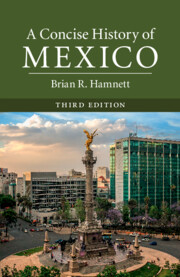Book contents
- A Concise History of Mexico
- Cambridge Concise Histories
- A Concise History of Mexico
- Copyright page
- Contents
- Plates
- Maps
- Preface to the Third Edition
- Preface to the Second Edition
- Preface to the First Edition
- Acknowledgements
- Abbreviations
- Chronology
- 1 Mexico in Perspective
- 2 The Pre-Columbian Era
- 3 The European Incursion, 1519–1620
- 4 New Spain, 1620–1770: Spanish Colonialism and American Society
- 5 Destabilization and Fragmentation, 1770–1867
- 6 Reconstruction, 1867–1940
- 7 The Monopoly Party, 1940–2000
- 8 Cultural Developments Since Independence
- 9 The Changing Face of the Republic, 2000–2019
- 10 Mexico in the World: International Relations from 2000
- Final Comments
- Bibliography
- Index
8 - Cultural Developments Since Independence
Published online by Cambridge University Press: 17 January 2019
- A Concise History of Mexico
- Cambridge Concise Histories
- A Concise History of Mexico
- Copyright page
- Contents
- Plates
- Maps
- Preface to the Third Edition
- Preface to the Second Edition
- Preface to the First Edition
- Acknowledgements
- Abbreviations
- Chronology
- 1 Mexico in Perspective
- 2 The Pre-Columbian Era
- 3 The European Incursion, 1519–1620
- 4 New Spain, 1620–1770: Spanish Colonialism and American Society
- 5 Destabilization and Fragmentation, 1770–1867
- 6 Reconstruction, 1867–1940
- 7 The Monopoly Party, 1940–2000
- 8 Cultural Developments Since Independence
- 9 The Changing Face of the Republic, 2000–2019
- 10 Mexico in the World: International Relations from 2000
- Final Comments
- Bibliography
- Index
Summary
- Type
- Chapter
- Information
- A Concise History of Mexico , pp. 390 - 431Publisher: Cambridge University PressPrint publication year: 2019

